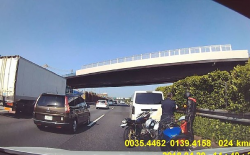
— A Tesla Model X lawsuit filed after a crash in Japan allegedly shouldn't have been filed in the U.S., according to a court response filed by Tesla.
The lawsuit was filed after a Model X with Autopilot engaged crashed into motorcycles, vehicles and pedestrians that were stopped on the side of the highway. The crash killed 44-year-old Yoshihiro Umeda, whose family sued Tesla by claiming the Autopilot system failed to prevent the deadly crash.
The Model X driver was falling asleep when the crash occurred, but the plaintiffs say their family member was killed by defects in the vehicle and the Autopilot system.
According to the lawsuit:
"The driver of the Tesla Model X was found to have been dozing shortly before the crash, and Tesla will expectedly lay all of the blame for this tragic accident on this individual."
Tesla agrees a Model X crash occurred in Japan on April 29, 2018, involving Japanese residents and a Tesla driver operating the SUV with Autopilot enabled.
The automaker points out the Model X driver ignored the owner's manual by failing to maintain control of the vehicle when it came upon a situation that required intervention by the driver.
Tesla also references official reports about the driver falling asleep at the wheel when the Model X crashed into other vehicles and Mr. Umeda.
Tesla also notes the driver of the Model X was tried in Japan and is currently serving a three-year jail sentence in Japan because he caused Mr. Umeda’s death due to his faulty driving and failure to maintain control of his SUV.
Tesla denies any defects in the design of the vehicle caused or contributed to the crash or fatality, and denies “patent defects in Tesla’s Autopilot technology and suite of driver assistance features, particularly in regard to Tesla’s driver monitoring system…”
According to Tesla, the California court where the lawsuit was filed is the wrong venue because the Model X was sold in Japan to a Japanese citizen and resident and was serviced in Japan. Tesla says Japan has product liability laws, the statute of limitations has not run out and the plaintiffs can sue Tesla in Japan.
In arguing against the lawsuit, the automaker says the plaintiffs have "cobbled together hearsay materials from NTSB reports, articles, and other third-party sources to argue their case in their Complaint."
"Their 'allegations' include only snippets from those third-party materials that are argumentative and incomplete. Tesla denies that these allegations support or prove that a defect in the Model X caused or contributed to the crash or death of Mr. Umeda in this case or that any alternative design would have changed the outcome of this crash." - Tesla
In addition, Tesla believes the Model X was "used, abused, altered and/or modified after being placed into the stream of commerce in a manner which was not reasonably foreseeable to Tesla."
The Tesla Autopilot lawsuit was filed in the U.S. District Court For the Northern District of California, San Jose Division: Tomomi Umeda, et al., v. Tesla, Inc, et, al.
The plaintiffs are represented by the Law Offices of Edward C. Chen, and ZeLo Japan.




